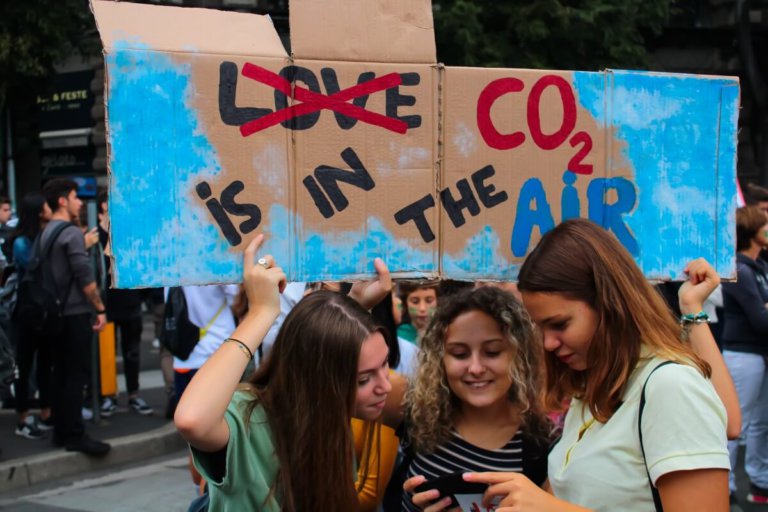
With global youth climate strikes rising as fast as ocean temperatures and high-tide flooding risks, the only answer to these global warming warnings seems to be collective change.
Changing the way we live.
Students must encourage their housemates to unplug electronics when they’re not in use, and urge landlords to look for the Energy Star label when buying replacement appliances.
Changing the way we eat.
We must shift towards plant-focused diets, growing our own food where possible, purchasing organic produce, and consider the benefits of eating insects.
Changing the way we think.
We must believe in ourselves, in our daily choices and in our ability to reverse climate change before it’s too late.
Deemed impossible by some but entirely feasible by others, these small changes to our lifestyles can amount to huge changes for the well-being of our planet.
As a recent survey from the Kaiser Family Foundation and The Washington Post uncovered, “About one in four teens say they have taken some action to express their views on climate change in past three years.”
It’s no surprise that many learners are attempting to combat eco-anxiety by opting to study environmental and engineering disciplines at university, or by taking a keen interest in the matter while at school.

Would you change your lifestyle for the well-being of our planet? Source: Markus Spiske/Unsplash
One company that’s striving to stop climate change from reaching dangerous levels is Climeworks.
Founded by mechanical engineers Christoph Gebald and Jan Wurzbacher, Climeworks captures CO₂ from the air with the world’s first commercial carbon removal technology.
From commencing research on direct air capture in their Masters’ studies at the Professorship of Renewable Energy Carriers at ETH Zürich in 2007, to creating an organisation that’s unlocking an emissions-free future, the founders have taken this inspiring initiative further by enabling everyone to remove the travel emissions that cannot be avoided.
Working alongside a highly driven team, Communications Manager Louise Charles believes it is fundamental that students and the younger generations are informed about possible climate solutions.
In an interview for Study International, she explained how the organisation is helping climate-caring students scale back their carbon footprint with subscriptions, encouraging them to make an impact by removing their travel emissions from the air.
Believing that technology will have a positive impact on the future workforce, especially for the progression of direct air capture technology, Louise believes there will many more jobs will arise as the industry develops.
“As an illustration, we came from a small team of three on a lab-scale level 10 years ago, to a total of 75 full-time employees today”, she says.
With such rapid growth, Climeworks demonstrates the lasting pay-off of pioneering ideas and campus collaborations.
“The inspiration for Climeworks goes back almost two decades. In 2003, Christoph and Jan met for the first time in Zurich to study mechanical engineering. During their first conversations, they asked each other about their dreams, and their answer was the same: they both wanted to one day start a company that helps preserve our planet.
“From day one at university, they kept on repeating their dream and as engineers, focused on what they did best: developing technology. During their PhDs, they researched how to capture CO₂ from the air, continued as entrepreneurs and founded Climeworks in 2009 as a spin-off from ETH Zurich,” Louise explains.
How does #directaircapture contribute to removing excess carbon dioxide from the atmosphere? This infographic gives a good overview of the various applications. pic.twitter.com/pkkdbGFLej
— Climeworks (@Climeworks) November 21, 2019
Unearthing their entrepreneurial spirit at university and pushing it into a planet-saving operation, the duo’s innovations now have the potential to reverse the devastating effects of climate change.
Hoping to provide a healthier, more habitable planet for future generations, it’s a great example of how far engineering courses and sustainable concepts can go.
Referring to the multiple climate studies that have recently been published, such as the IPCC Special Report and the European Academies’ Science Advisory Council (EASAC) report, Louise emphasises that we must do everything we can to reduce carbon emissions and actively remove CO₂ from the atmosphere.
And by highlighting that Direct Air Capture is one successful way of doing so, the company’s CO₂ capture plants are making what once seemed impossible, possible.
For students considering an engineering or environment-related career, as well as those looking to use their degree to help save the planet, not to mention those who feel inspired to help remove CO₂ from the atmosphere with Climeworks, Louise implores you to pursue it.
“We need more people working in the climate field to join our fight!”
Last week, our founder Christoph Gebald presented Climeworks at the Next Aviation Symposium. Climeworks is part of a European consortium that aims at building the world’s first industrial facility to produce #jetfuelfromair. @INERATEC_global @sunfire_dresden @SKYNRG @Schiphol pic.twitter.com/7irPjcUtnI
— Climeworks (@Climeworks) November 18, 2019
Liked this? Then you’ll love…
RocketShoes: Empowering studies through equity of assets
She Loves Data: Workshops that inspire women to find their voice in technology







